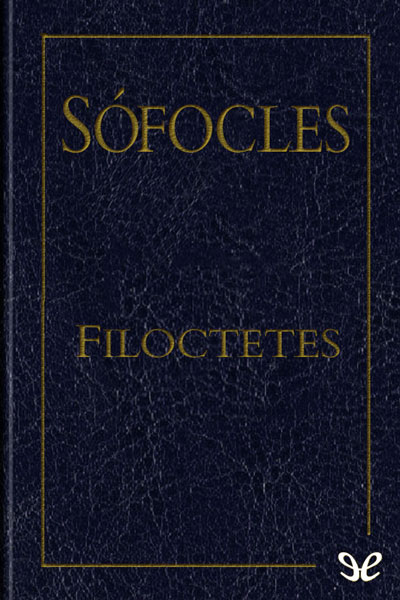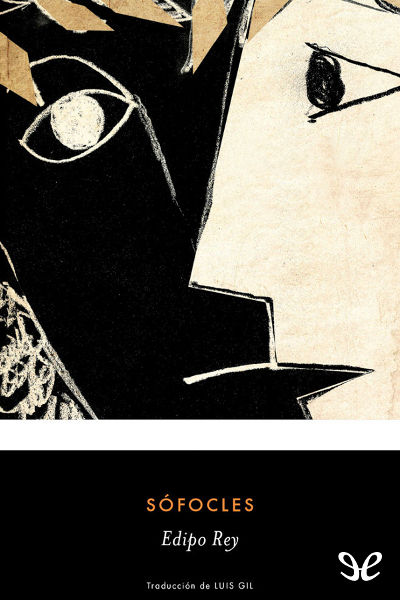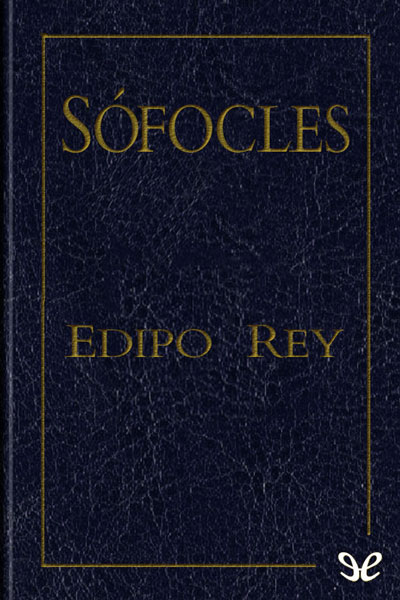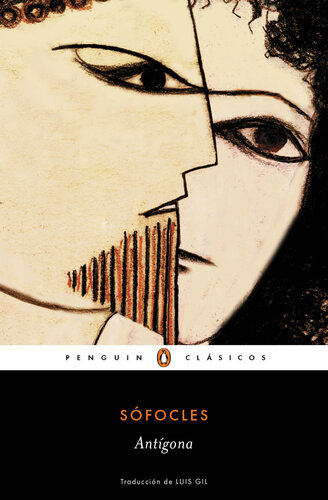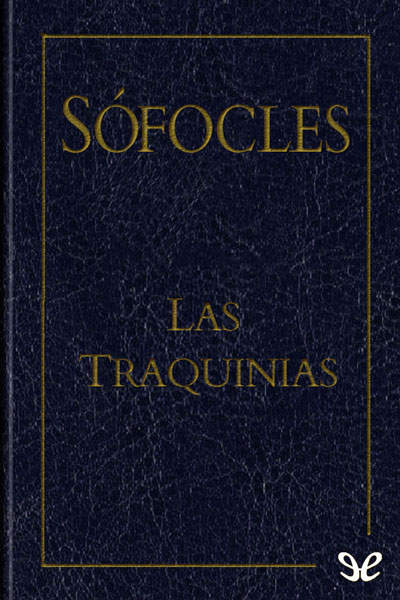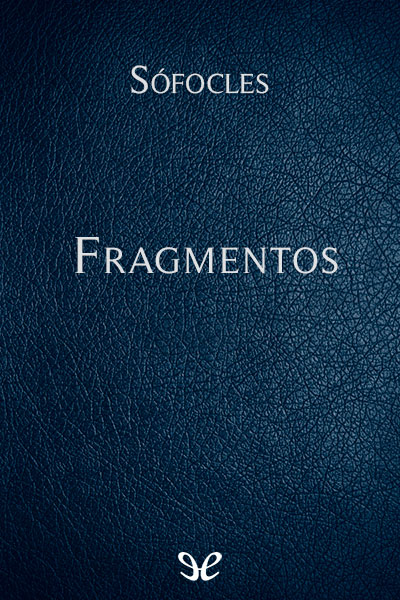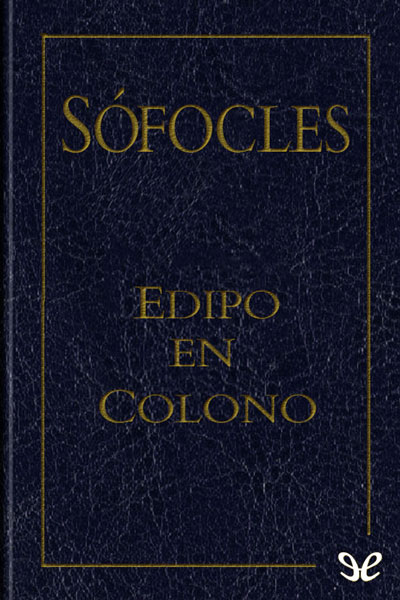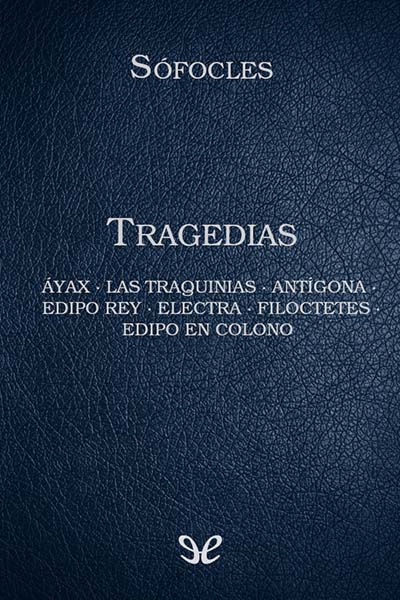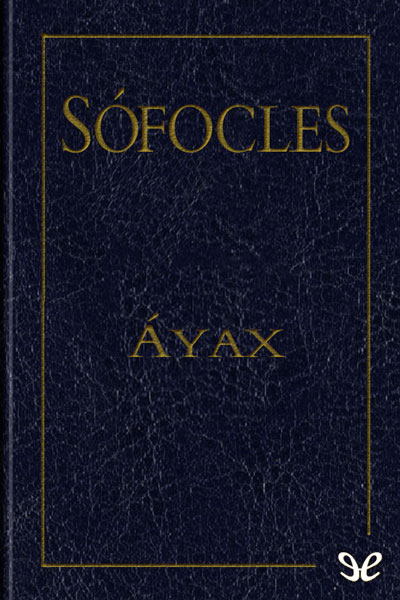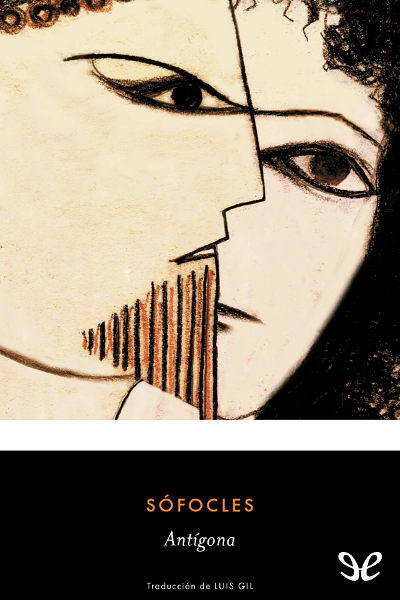oleebook.com
Èdip Rei de Sófocles
de Sófocles - Género: Drama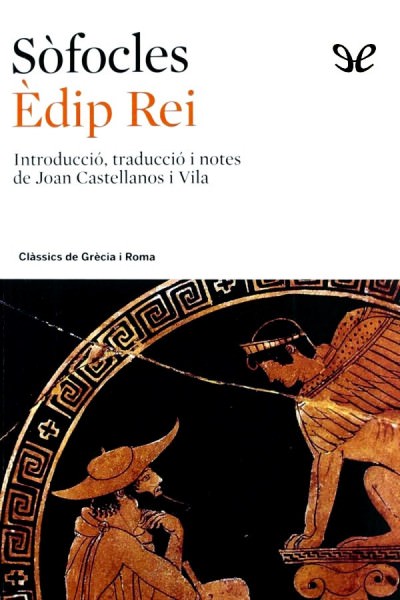
Sinopsis
Èdip ha esdevingut rei de Tebes, després de vèncer lEsfinx i de casar-se amb Iocasta, vídua del rei Laios. Una terrible pesta sha ensenyorit de Tebes i Èdip cerca les causes de linfortuni fent una consulta a loracle dApol·lo a Delfos i també a Tirèsias, el sacerdot endeví de Tebes. La resposta és clara: la pesta sacabarà quan hagi estat venjada la mort de Laios.
Descargar
Descargar Èdip Rei ePub GratisLibros Recomendados - Relacionados
Reseñas Varias sobre este libro
What can I say about Sophocles Oedipus Rex that has not already been said? Apart from the patricide and the infamous incest, this is an ancient tale of angst and overall calamity. But since I recently revisited it, this legendary tragedy hasnt left my mind.
"Look and learn all citizens of Thebes. This is Oedipus.
He, who read the famous riddle, and we hailed chief of men,
All envied his power, glory, and good fortune.
Now upon his head the sea of disaster crashes down.
I felt after reading the play that there was not really anything that Oedipus could have done to get himself out of his destiny. In fact, it seems that the more he attempts to get out of it, the deeper he is immersed in its inevitability. It is simply that there was no way for him to avoid doing it all and facing his fate. After hearing of the prophecy he flees because he doesn't want it to come true, but there is a lot that he does not know and a lot that he is not being told. His parents, when told by the oracles decided to sacrifice him. But he was saved by the compassionate nature of humanity. Later on, his step parents also leave him in ignorance, and in hiding the truth they are also making the prophecy come true.
The theme as I see it, therefore, is of fate versus freewill. However, there really does not seem to be any freewill here. Every decision that Oedipus makes only brings the revelation closer to being fulfilled.
But to fully understand Sophocles work, you have to know that for the ancient Greeks the word "tragedy" didn't mean a lamentable, dreadful, or fatal event or affair; calamity; disaster. For them the idea of such a play, that had a certain and defined theme and structure, is about a person that because of a single tragic flaw becomes the victim of the gods. The specific purpose was called "catharsis", the audience watching the play should gain an emotional release that made your own trivial issues fade into insignificance. According to Aristotles Poetics the complexity of the plot is established through reversal, recognition and suffering. The tragedy is created, in part, by the complexity of its plot which leads towards the catharsis. The Chorus is crucial; its speeches are revealing. It is the cautious voice of collective wisdom. And from the very beginning of the play, the Chorus revealed the omen of disaster. This can all be summed up in the following lines:
"O god-
All come true, all busting to light!
O light- now let me look my last on you!
I stand revealed at last-
Oedipus is a passionate man, who asks questions and takes risks. Despite his flaws and his sins, Oedipus is good and always seeks the truth no matter how devastating. In the end, he accepts the responsibility for his actions, his fate and punishment. Does he have free will or the ability to choose his own path or is everything in his life been predetermined? Indeed, despite the prophecy, it can never be denied that Oedipus and his parents had made the choices, not the oracle or the Gods. Is the very idea of carving out your eyes, after discovering your wife is your mother in this incredibly packed tragedy that alleviates so much the enormous pain that seems so causeless? Is the existential angst finally satisfies by the human need to identify the guilty that alleviates our human sensation of utter, senseless and chaotic misery?
This is what torments us, being humans: we have free will but we can never control everything. Oedipuss specific life events arent exactly relatable to any of us, but the sensations are not less pertinent. Arent we used to impending unconquerable doom? I ask myself, could ignorance lead us through hell? Oedipus Rex doesnt make us only question the role of the gods (or whatever may decide our fate nowadays: politicians, the economy, the news, and even our own expectations!), but above all the argument of fate and destiny, and whether we are able to live without external powers deciding our chances. It also makes us question who we are; whether our personalities, or other personal characteristics, are a kind of destiny in itself.
Where's our human freedom? More important: do you feel a prevailing sense of inevitability, no matter what you do?! Why are we always being judged, by ourselves and by the world? If we try to transpose the play to today, many questions are still left with no definite answers. For certain, we can choose what we want to become. The curse is that our capacities are finite; we are not gods. What happened to Oedipus was the torture of being human, can we escape this curse?
Oedipus Rex is a literary masterpiece! Highly recommended!
ancient classics-literay-fiction greece ...more220 s Persephone's Pomegranate70 331
Beware: spoilers
I, too, would gouge out my eyes and flee my hometown if I found out I married my long-lost relative.
The Moirai (or Fates as they're more commonly known) played a cruel joke on Oedipus.
My childhood nemesis got married to her second cousin, but that's not as bad as what Oedipus did.
I have a soft spot for Oedipus because he is the father/brother of Antigone, my favorite heroine. Yes, he is her father AND brother.
People who know nothing about Oedipus:
Oedipus finds out his wife is also his mother, his children are also his siblings, his brother-in-law is also his uncle and the man he killed on the road was his father.
Is it wrong to laugh at this?
The fact he killed his father over road rage is the most Greek mythology thing I've ever read. Oedipus narrowly avoids being hit by his biological father's chariot at an intersection. The only logical solution is to kill Laius and his entourage. Common sense has no place in Greek mythology.
Why does everyone refer to this as a tragedy when it's obviously a dark comedy?
This reminds me of the Foo Fighters music video 'Walk,' where Dave Grohl experiences an existential crisis while stuck in traffic.
Let's rewind to the beginning.
There once was a king named Laius who ruled over Thebes. Laius had a beautiful wife named Jocasta and all the wealth and power he could desire. If this was a Disney movie, Laius and Jocasta would have a happily-ever-after ending. Unfortunately for Laius, he was a supporting character in someone else's (Greek) tragedy.
After receiving an oracle from Delphi, he was warned that if he had a child, the child would kill him and marry his wife. Can you tell where this is going? Laius got drunk one evening and forgot he wasn't supposed to have sex. We've all been there.
The oracle: don't have sex
Laius and Jocasta: what if we have sex, and if we conceive a child, we'll hire a shepherd to leave it on a mountain to die?
I find it amusing that the solution to all problems is abandoning a child on a mountain. It is reminiscent of what Priam and Hecuba did to Paris.
Several months later, baby Oedipus is born. Fearing the prophecy, Jocasta gives her child to a shepherd to be exposed on the mountainside. The shepherd takes pity on the child and gives him to another shepherd, who gives the child to the childless king and queen of Corinth.
Oedipus is raised by his adoptive parents in Corinth. He is happy until he consults the Delphi oracle, who predicts that he will kill his father and sleep with his mother. (In the days before Google, people relied on the oracle for information). Oedipus felt afraid and decided to nope out of Corinth to protect his 'parents.'
Long story short, Oedipus and his biological father meet on a random road, get into an argument, and Oedipus kills him. Road rage - claiming victims since the Heroic Age. Fate brings Oedipus to Thebes, where he becomes king and marries his mother, Jocasta, fulfilling the prophecy.
They have four children - Eteocles, Polynices, Ismene, and my beloved Antigone. Eteocles and Polynices are power-hungry idiots, Ismene is useless, and Antigone is a certified badass. That's all I have to say about that.
Throughout the book, Oedipus denies the truth and seeks reassurance that he didn't kill his father or marry his mother. Denial, thy name is Oedipus. Eventually, he accepts that he F up big time.
I shouldn't find a book that deals with attempted filicide, parricide, and incest funny, but I do.
Upon discovering the truth, Oedipus becomes furious and demands his sword to kill Jocasta. I can't help but imagine the poor servants who had to witness this unholy family drama unfold.
Luckily for him, she unalived herself. Oedipus is overcome by sadness. I'm not sure why. Just a moment ago, he was about to attack her with his sword. Anyway, he finds Jocasta dead and gouges out his eyes with the pins from her dress. Can this guy be any more dramatic?
Oedipus, saying goodbye to his daughters/half-sisters, Antigone and Ismene: Our family is messed up, and for that, I apologize. I can't be your dad anymore. I've asked your uncle Creon to take care of you. Farewell.
Me, having read Antigone:
After discovering the truth about his past, Oedipus decides to leave Thebes and go into self-imposed exile.
Upon reading it for the second time, do you know what I realized? If ancient Greece had traffic regulations, none of this would have occurred. Oedipus would not have killed his father and banged his mother if there were traffic lights and pedestrian crossings on the road. The absence of modern technology has led to all this drama.ancient-greece-rome-egypt classics mythology207 s62 comments Lea123 664
Sophocles' Oedipus Rex is arguably one of the best plays of all time that inspired a large portion of the modern train of thought, and literary critics gave the play the epithet Mona Lisa of drama. It was certainly Aristotles favorite play as he stated in Poetics, naming Oedipus the perfect tragic hero. The core of the play is not what happens on the stage, but what already happened offstage, as Sophocles reveals the consequences of the acts, not the acts themselves. To understand the context of the play, one must dive into the mythology.
Oedipus genealogy
Oedipus's father, Laius, was a descendant of Cadmus, an ancient king of Thebes, and Cadmus both sister Europa and daughter Semele were raped by Zeus. Laius himself raped Chrysippus, son of king Pelops, who cursed Laius that his son would kill him. Pelops also had his trauma with his father Tantalus who sacrificed Pelops; he cooked him and offered him as a meal. Seeing what he had done, the gods brought Pelops back to life and doomed Tantalus to eternal thirst and hunger. So Oedipus' acts were a consequence of the long-standing history of rape and violence in the family tree. The direct sequence of transgenerational hatred and sacrifice in the father-son relationship finally led to its result - as in psychosexual development, oral and anal aggression preceded incest with mother.
Oedipuss birth
Having the prophecy in mind, Laius did not want to have children, and his wife Jocasta seduced him while he was drunk. After Oedipus' birth, Laius pierced the legs of his newborn baby in the ankles and then left Oedipus to die on a mountain where shepherds saved him. Oedipus's birth is accompanied by common themes of the birth of a hero as a Divine child (Moses, Jesus) - there is an attempt of infanticide, and nature, not civilization, accepts the hero and saves him. The birth of Oedipus is a sign that he is preordained to be a hero - one who will change the current order and rules in society and bring a new element.
Oedipus and Sphinx
Later on, also not seen in the play, Oedipus saves the city of Thebes from a monster Sphinx, sent by Hera to punish Thebes for the crimes of Laius. Sphinx posed a riddle to Oedipus; What walks on four legs in the morning, on two at noon, and three legs in the evening? Oedipus answers correctly - a man and here is the first irony - the answer is man but also Oedipus himself, and in the unity of time and place in the play of Oedipus Rex, we will see Oedipus in all three states in one day, making himself the living answer to the riddle.
The Plague
The play starts with a priest begging Oedipus for help as the city of Thebes suffers greatly because of the plague. Here is prominent the concept of pollution and bloodguilt that were of great importance in Greek society. The Greeks believed that the destructive acts of nature were the work of the gods - so they would suggest that a monumental transgression was committed that violates the order of creation, moral wrongdoing that created bloodguilt that requires purification. What drives Oedipus to knowledge is the search for meaning of suffering.
Creon suggests that the cure for the plague is to know the king's Laius murderers and execute them, or to banish them from Thebes. So, the answer to the riddle of plague is also Oedipus himself, as he is the killer of Laius. The one who saved Thebes actually destroys it and Oedipus ironically curses the murderer of Laius, not knowing he is cursing himself. To cleanse the city of Thebes and be its saviour, Oedipus will have to become a living sacrifice, mirroring the image of Jesus, a scapegoat figure that carries the sins of the collective.
All people come to psychoanalysis with the plague of their own, Freud noted - something that bothers them that actually points to deeper issues, ones that are not so easily discovered.
Search for truth, knowledge and identity
The circumstances of his birth, lineage, and life have made the art of knowing (the Greek oida, I know) the essential task of Oedipuss life, which goes with the essence of Apollo and his maxima at the prophecy in Delphi - "Know thyself." Oedipus is the man of knowledge who solved the Sphinx riddle and the inherent part of the riddle is idea of man's knowledge and self-reflection. Oedipus' ruin is caused by his loyalty in resolute search for the truth which serves as a warning - being an honest seeker of truth oftentimes leads to the ugly truth about yourself - that you yourself are all the things you hate, that you yourself broke the ultimate social taboos. Freud believed that Sophocles' tragedy is an act of revelation, which emphasizes the connection between tragic recognition and psychoanalytic work. Both liberation and tragedy come through searching for yourself, as the answer to the question - Why is there evil and suffering? is: Because of my corrupt nature. Sophocles poses the question; Is all knowledge good? Tiresias, the prophet that Oedipus begged to tell him the truth, refused in the beginning, but Oedipus did not respect his authority. Tiresias then has a beautiful line:
How terrible is wisdom when / it brings no profit to the man thats wise!
Oedipus remains faithful to the end to his assumption that knowledge - consciousness - is superior to ignorance - illusions, and that is ultimately his demise. H. E. Grimaldi said: "It is not good to realize, it is not healthy to realize, if one realizes the entirety, it psychotisies«.
This goes against the whole core value of Greek culture - to know, embodied in Apollo, god of light, knowledge and reason. Even though Greek culture gave foundations to the modern Western civilization - much Oedipus gave a lot of answers to fundamental questions - it collapsed and was destroyed, again Oedipus, in the questions of flesh, flooded with bloodguilt and sexual perversions. Even with all the sacrifices we make to Apollo, at night we serve Bacchus in primordial impulses we fail to contain, because the law of Bacchus, not Apollo, is intertwined with our flesh. Oedipus and Greek culture give a universal example of a conscious man that is crucified by unconscious impulses, and collapses under them, as the gap between reason and body becomes wider, materializing the ancient cry of St. Paul; With the mind I myself serve the law of God, but with the flesh the law of sin. Opposite to what Greeks believed, knowledge does not bring salvation, as all the knowledge we have in Western civilization did not change the vile nature of men.
Sight and Blindness
"Oida" in Greek also means - to see. The theme of sight and blindness is prominent in Oedipus Rex. Sophocles poses a lot of contradictions; Tiresias, a prophet who was blind, could see and understand the truth at the level of Apollo and knew the whole truth about Oedipus. Oedipus, a man of knowledge, could see, but he did not know. When he finally found out, he couldn't bear to see and made himself blind. Here we can also see a warning, as Oedipus's fall is often reacted in the fall of the wise man - a man who has a great deal of wisdom is usually paradoxically completely blind to the truth about himself. Oedipus solved the question posed to civilization, but could not solve the question of his life and he did not see that these two questions are actually one. This states the important lesson - the universal question are always easier to solve than personal ones. The choir also states that they would have d to have been blind and had not seen this - the story of Oedipus is difficult for us, as it brings us a great deal of discomfort and we sometimes wish we did not see Oedipus in ourselves.
Oedipus Complex
As Oedipus brings a great deal of discomfort to the choir, so does the Oedipus complex to the whole of humanity, a term coined by Freud that means the desire to possess the parent of the opposite sex and eliminate the parent of the same sex. According to psychoanalytic theory, the complex appears during the Oedipal phase of libidinal and ego development that is, between the ages of three and five years. The resolution of the Oedipus complex is identifying with the father, constructing the Superego, and transmitting sexual desires from the mother to other female figures. Freud believed that the Oedipus complex must be resolved, not suppressed - otherwise, neurosis arises and reflects in the symptoms of suppressed desires, ones that we can analyze in Hamlet.
Freuds life
What is perhaps not very much known, is that Freuds life in a great deal mirrored Oedipus'. He was the eldest son in his family and his mother was pretty and 20 years younger than his father. Freud has always been very attached to his mother, and he was her favorite child. In the process of auto analysis, he was driven to think of the Oedipus complex. Oedipus and the mythical paradigm became the bearer of a new hypothesis and seemed to guarantee its universality. After reaching the age of 40, after the death of his father, Freud ceased his active sexual life, which could be interpreted as equivalent to blindness or castration. His daughter, Anna Freud, played the role of Antigone, and his death in exile in England parallels Oedipus' death on the Colon. In that sense, we can have a nuanced understanding of the famous quote about Oedipus from the The Interpretation of Dreams, chapter V;
His destiny moves us only because it might have been oursbecause the oracle laid the same curse upon us before our birth as upon him.
The Murder of Father
In the patriarchal society of ancient Greece, the aversion to the murder of the father was extremely intense, as we can see in Plato's punishment for the father-killers; For this act, he says, there can be no purification: the murderer will be killed, his body will be laid naked at a crossroads outside the city, every civil servant will throw a stone at him and curse him, and then the bloody remnant will be thrown outside the city territory and leave it unburied.
Freud believed that death wish aimed at our father is deep-rooted in our unconscious, as he explained in Totem and Taboo. Freud pointed out that three epochal works of literature deal with the same theme - patricide - referring to Oedipus Rex, Hamlet and The Brothers Karamazov. Freud also believed that aggression towards the father is the basis for regicide, also committed by Oedipus, as well as being explored in Julius ceasar, and also the root of the murder of the prophet in the monotheistic religions and crucifixion of the Son of God.
Oedipus consciously repeats the wish to murder father by attacking the godly authority of Tiresias and the political authority of Creon, as we continually repeat our unconscious death wish aimed at father in passion with which we attack the male authority in different forms, over and over again. Is not the most hated figure of the modern world the "white man in a position of power"?
As Freud said in Reflections on War and Death; And so, if we are to be judged by our unconscious wishful impulses, we ourselves are, primaeval man, a gang of murderers.
Laius complex
Georges Devereux in his essay; "Why Oedipus Killed Laius" added Laius and Jocasta's complex, pointing out the sadistic and (homo)sexual components of these complexes. This neglect of the complementary Oedipus complexes Devereux locates in the adult's need to place all responsibility for the Oedipus complex on the child and to ignore "some parental attitudes that actually encourage Oedipal tendencies in the child." Laius rapes Crispus, son of Pelops, who curses that his own son will kill him in what seems to be a protection from the aggressive and homosexual impulses of the father. Laius is not a good man but one who violates good customs, and his death is caused by his character (as Oedipus killed him in self-defense) which included his propensity for violence. His fate is a personification of character structure and its need to carry out its intra-psychological conflicts in the reality. Oedipus' aggression against his father was fueled by his father's aggression, perpetuating the cycle of hostility between the father and son, as tyrannical aspects of patriarchy add fuel to our aggression towards the symbolical father.
Longing for Mother
Many a man has slept with his mother in dreams. He who dismisses such thoughts lives easiest.
Incest is more destructive to life than paternal murder; one incestuous act violates the sanctity of both maternal and marital love. Christopher Rocco writes: In breaking the taboos against patricide and incest, Oedipus destroys the boundaries that separate the civilized city from savage nature, humanity from bestiality. By killing his father and wedding his mother, Oedipus disrupts the natural succession of generations..
Melanie Klein, the famous theorist of psychoanalysis post-Freud, argued that sexual impulses are not vital in the relationship with the mother, as self-formation is accomplished through a complex relationship with others, not only through psychosexual maturation. She stated that longing for a mother does not consist of sexual feelings only, but stems from the relationship with the mother- which means life, care, love, play, fulfillment, pleasure - in fantasy all that a child aspires to. But Klein also observed that child has ambivalent feelings towards both of his parents, as it both loves and hates them. Dorothy Dinnerstein in her work Mermaid and Minotaur talks about the earliest experiences of an omnipotent mother that creates fear and aversion to woman and nature, as a person does not want to re-experience extreme dependence on a powerful mother, which is why he tries to control her. Here the issue of sexual attraction is seen as an attempt to establish power over an omnipotent mother, as sexualization makes a woman a less terrifying, powerful object. According to that, we can observe Oedipus's marriage with Jocasta as a will to power.
But the sexual aspect of the Oedipus complex is one thing that always troubled society the most invoking the repulsion and ridicule of Freuds thought. At the end of the day, Oedipus did not know that Jocasta is his mother, does that makes all sexual attraction of young men to older women incestuous? Anyways, the modern phenomenon of MILF, prevalent in all porn sites, speaks louder than Freud even could, confirming once again that art replicates reality.
Determinism and free will
How free was Edip from his destiny is the question that bothered the scholars for years. Did Sophocles reject individual responsibility and showed that divine forces determine crime and make people's moral instincts powerless? Certain Oedipal actions act are fatefully bound by the fulfillment of prophecy, but everything he does on stage from the first to the last he does of his own free will. Dodds argued that what makes Oedipus so attractive is "the spectacle of a man who freely chooses from the highest motives a series of actions that lead to his own downfall."
Guilt and justice
Oedipus committed paternal murder and incest; that is, he greatly offended two fundamental laws, or holiness, of human life was he innocent and did he deserve punishment? Can a man be guilty of something he has committed out of ignorance? Plato among the polluted people especially includes a man who actually committed an offense with his own hand even if he did what he did completely unintentionally. Someone uses his free will to unconsciously select a woman that resembles his mother - but he still has to live with the consequences of the choice. Aristotle talks about hamartia - tragic guilt - that influenced the interpretation of Oedipus greatly. Oedipus fulfills prophecy, and it is at the same time necessity and causality - the things he did, he did in complete disregard for the facts he had.
Freud stated: "Accident and prophecy here are only the materialization of inner necessity: the fact that the hero committed a crime unintentionally, even without knowing that he committed it, should be understood as a true expression of the unconscious nature of his criminal aspirations."
And that is the brilliance of Oedipus Rex play - if Oedipus killed any old man, or married any older woman the same unconscious aspirations of Oedipus complex would be at play here, ones that we ought to analyze to get to them - but the irony of the situations is that he accidentally perfectly embodied the symbolic meaning of the acts - and in his fate, the symbolical meets the factual. Oedipus's self-mutilation and self-expulsion are equally free acts of choice. Oedipus's punishment comes from himself, the Superego is the one who punishes us for our unconscious impulses.
Oedipus as a Hero
Oedipus's guilt, but also virtuosity, makes him a perfect hero. Oedipus is both a victim and a criminal, both a savior and destroyer. In the beginning, he is a model of virtue; optimistic, confident and benevolent - but when his rule is threatened, he becomes paranoid, angry, punishing and tyrannical. Oedipus embodies the pairs of opposites and all our conscious and unconscious ambivalence. Oedipus is a symbol of the triumph of light over darkness, the conscious over the unconscious, a man who was consistent and loyal to truth till the end-prepared to pay a tragic price of self-knowledge.
Nietzsche in The Birth of Tragedy gave the perfect commentary and conclusion to Oedipus;
The noble human being does not sin, so this profound poet wants to tell us; every law, all natural order, indeed the moral world, may be destroyed by his actions, yet by these very actions a higher, magical circle of effects is drawn which found a new world on the ruins of the old one that has been overthrown.classic favourites fiction ...more199 s Ahmad Sharabiani9,564 148
???????? ???????? = Oedipus Tyrannus = Oedipus = Oedipus Rex = Oedipus the King (The Theban Plays #1), Sophocles
Oedipus the King, is an Athenian tragedy by Sophocles? that was first performed around 429 BC. Oedipus sent his brother-in-law Creon to ask advice of the oracle at Delphi concerning a plague ravaging Thebes.
Creon returns to report that the plague is the result of religious pollution, since the murderer of their former King, Laius, had never been caught. Oedipus vows to find the murderer and curses him for causing the plague. ...
???????? ??? ??? ?? ?????: «???? ??????»? «?????? ???»? «?????? ??????»? ????? ?????? ????? ??? ???? ? ??? ??? ????? ???1974??????? ? ??? ???? ???2007??????
?????: ???? ??????? ???????: ???????? ?????: ????? ?????? ??96?? ??? ??? ?? ?????: ???? ?? ?????? ??212?? ?????: ????????? ??? ????????? ????? - ??? ???? ??? ?? ?????
?????: ???? ??????? ???????: ??????? ?????: ????? ????? ???????? ???1387? ??72?? ????9786005209006?
?????: ?????? ???? ?????: ????? ?????? ?????? ?????? ???1387? ??132?? ????9789646088733?
?????: ?????? ??????? ?????: ?????? ????? ?????? ???1389? ??14?? ????9789648727890?
????? ?? ?????????
.????????: ????????? ????? ??????? ?? ?? ?? ?? ????? ?? ?? ???????? ??????
..??????: ??? ?? ??
.????????: ???? ??? ???? ??????
..??????: ????? ??????? ???. ???? ???????. ?? ????????? ????? ?? ?? ??? ????? ????. ?? ???? ???????? ?? ??? ????? ????. ??? ??????? ?? ??????? ?? ??? ????
.????????: ?? ?? ?????
..??????: ?? ??????? ????? ?? ???? ???? ???????? ?? ??????? ?????? ??? ???
.????????: ???????? ????? ?? ??? ????? ????? ???? ?? ???
..??????: ???? ????? ?? ?? ??? ??? ?? ???. ???? ??? ?? ???(??????? ? ??????) ?? ?? ????
.????????: ??
..??????: ??????? ????? ???
.????????: ??? ?????
..??????: ? ???????? ??? ???? ????
.????????: ?????? ?? ?
..??????: ????????! ?? ??????? ??? ???
.????????: ??? ???? ??
..??????: ??? ?? ???? ???? ? ???????? ?????
.????????: ?? ?? ?? ?????
..??????: ??? ??? ?? ??
.????????: ?? ???
..??????: ??? (????????? ?? ???) ??? ?? ???? ?? ???????? ??? ????
?????? ?????????
????? ???? ???? ?????? ?? «????» ??????? ??? ??? ?? ????? ? ?? ???? ???? ?????? ???? ???????? ???????? ? ?????? ??? ??? ?? ??? ? ???? ???? ???????? ???? ? ???? ?????? ?? ??? «????» ???? ??? ?? ?????? ?????????? ?? ???? ?? ?????? ??? ??? ????? ??? ????? ?? ??? ? ???? ?? ????? ???? ?? ????? ???? ??? ??? ???? ????? ????? ????? ???????? ? ???? ?? ???????? ? ?? ?? ?? ?????? ????? ?? ???? «????» ????????? ???? ???? ?? ?? ??? ??? ???? ???? ??????? ? ???? ?? ????? ?? ???? ???? ??????? «????» ?? ????? ????? ?? ????? ? ??????? ?? ?????? ??? ???? ??????? ? ??? ?????????? ? ??????????? ?? ?? ??? ? ???? ????? ??? ?????????? ???? ???? ?? ??????? ?? ?? ???? ????????? ?? ??? ?? ?????? ? ??????? ??????? ?? ?? ??????? ?????? ?????? ?? (?? ??? ????? ?? ????) ??????? ? ?? ??? ??? «??» ???????? ?? ?????? ? ?? ??? ?? ?????? ????????? ????? ?? ?? ?????? ?????? ?????????? ? ??? ???? ?? ???? ???????????? ???? ? ??? ???????? «????» ????? ???????? (??????? ?????) ?? ???? ???? ???????? ? ???????? ?? ??? ???????? ?????? ??? «??» ?? ??? ??? ?????????? ??????? ???? ??? ?? ?? «????» ????????? ? ??? ???? ? ??? (????????) ??? ?? ??? ?? ?????????? ?? ?? ????? ??????????? ???? ? ????? ?? ?? ??? ???? ??????? ? ??? «????» ??? ??? ?? ????? ??? ?? ???? ?????? ????? ???????? ???? ??????? ?? ??????? ???? ?? ????? ??????? ???????? ?? ??? ??? ?? ????? ? ?? ????? ??????? ???? ???? «????» ?? ?????? ??????? ????? ?? ?? ?????????? ??????? ?? ??? ??????? ? ?????? ???? ??? ???? ?? ????????
????? ?????? ????? 25/09/1399???? ???????? 28/08/1400???? ???????? ?. ??????? Luís2,092 880
I d "Oedipus the King" - but not as much as other tragedies - for example, "Antigone" by the same author.
The piece is very well made; the characters are consistent from start to finish; the main character, Oedipus, is very successful, and his journey is fascinating. Moreover, it has an exciting evolution of the play; some stunning pieces are still of excellent quality. "Oedipus King" has the merit of not being boring. Without finding the work transcendent and brilliant, one can, it seems to me, at least have a pleasant time reading it.
However, we must admit that I was not transcended by "Oedipus King"; I only loved her and nothing more. Indeed, if "Oedipus the King" is an exciting piece in many respects, the fact prevents us from fully appreciating it. Indeed, a large part of the play was based on the name of the murderer of Laios. However, very few people today are unaware of this revelation. So when it occurs, it cannot have the same effect on us as it does on the characters. In my opinion, this prevents us from empathizing with the characters, understanding them, and feeling the shock of this revelation, which is the play's high point.
I find "Oedipus the King" exciting but, in certain respects, a victim of its success. This success prevents, in my opinion, the work from having all the interest that the play could claim to have.2022-readings e-4 english-editions128 s2 comments julieta1,221 29.6k
El complejo de Edipo es lo único que yo conocía de esta obra, sin haberla leído todo mundo sabemos sobre la lectura que se le ha hecho desde el psicoanálisis. Pero también está el tema de que Edipo está buscando a un culpable que resulta ser él. Es muy fuerte como historia, una tragedia que me parece súper moderna, y esa idea, el enemigo está dentro de tí, tiene un gran simbolismo, que me parece importante, y en todo momento presente, actualísimo. europa teatro128 s Renato36 142
"Look and learn all citizens of Thebes. This is Oedipus.
He, who read the famous riddle, and we hailed chief of men,
All envied his power, glory, and good fortune.
Now upon his head the sea of disaster crashes down.
Mortality is mans burden. Keep your eyes fixed on your last day.
Call no man happy until he reaches it, and finds rest from suffering."
I believe that in one way or another, everyone - at least to some extent - has heard of the story of Oedipus and Jocasta. It's one of those tales that's been on our collective consciousness forever even though we may not even be able to assertively answer about its origins. The same might be said, for example, of Odysseus and Don Quixote: they've been so used and re-used, adapted and re-adapted throughout so many generations and in so many different formats that one might as well state they were simply born within us, for they're public and common knowledge. I, for one, believed Oedipus and Jocasta's tale came from the Bible! As I was never a religious person and therefore never payed much attention to it - and unfortunately never decently studied Greek mythology -, I used to unconsciously attribute to the Bible the origins of all stories which seemed to me as too ancient to properly date. I'm terribly sorry and embarrassed about that, Sophocles. I stand corrected now.
Every time I read an ancient text I recurrently find myself to blame because of the same mistake: being surprised by its quality despite being written so long ago. It turns out more and more I agree with an analysis I've read somewhere that states that, un science, there is no progress, no discovery in art. An artist, while he creates, is not helped by the efforts of all the others - scientists are - and depends upon his own individual truths. The ancient art is in no way a primitive version of the art created by our contemporaries. So it should not be astonishing to me that a text written thousands of years ago possesses the same qualities or refinement of awarded pieces that only now cracked their fifty years of age mark.
Putting the story itself a little aside, it's precisely this refinement, this brilliance in the construction of the narrative that impressed me so much. The pace, the development of the action and disentanglement of this intricate plot was written so masterfully that it requires little investigation in discovering the reasons why it became so influential to the subsequent generations. Now, I'm not knowledgeable enough to affirm that Sophocles himself wasn't influenced by other works that preceded him, so I'm not claiming unprecedented originality to his name here, but merely(!) talent in using the most appropriate techniques to write so many wondrous predicates into this marvelous play. The ability with which he created, sustained and solved the various mysteries that surround this classical tragedy is very remarkable, as well as a striking mixture of pity and horror that the themes developed here successfully imposes on the reader.
Themes such as fate, free will, interference in human life by the Gods (for some that hasn't changed much, has it?) and its inflexible exploration of human nature and suffering are skillfully written in the form of intense dialogues and shocking revelations that could even prove too disturbing had not been Sophocles accurate treatment, much the reader ly pities Phedre's actions instead of automatically blaming her for her fate. The ever so mesmerizing battle between destiny and logical consequences also plays a big role here: does fate completely control Oedipus's actions - is it all predetermined? -, or is he simply a victim of his own doings, even if unknowingly?
Oedipus Rex (also known as Oedipus the King and Oedipus Tyrannus) tells the story of Oedipus, a man that's respected and loved in Thebas, where he is King after solving the riddle of the Sphinx and marrying Jocasta, the widow of the previous king. After a plague threatens his kingdom, he is begged by a chorus of Thebans for help and Oedipus sends for an oracle in order to find some guidance. As it turns out, Tiresias, the blind prophet, believes the King is the only one to blame for his malady. At first outraged and, because of it, incensed into proving his innocence, he starts connecting the clues that he receives from various bits of information gathered by different sources. As it turns out, Oedipus, after leaving his home in Corinth due to a prophecy which stated he would murder his father and sleep with his mother, entered a fight with some men at a crossroads and ended up killing them, before arriving in Thebes. One of these men was Laius, Jocastas husband and previous King. In order to escape the prophecy, Oedipus fell into it, as he was Laiuss son who was sent away to be killed many years ago exactly because he received an oracle that he would be murdered by his own son. Oedipuss life ended up being spared and, unknown to him, he was adopted by the King of Corinth. Now it was clear to him that, besides murdering his father, he has slept with his own mother and fathered children that were also his brothers and sisters. Jocasta, upon finding out this complex imbroglio, can't deal with the unimaginable situation and kills herself. Completely horrified and ruined by everything he found out, Oedipus blinds himself (ironically at the precise moment when he sees the whole truth) so he wouldn't ever again need to see his own feelings of shame and humiliation mirrored in the faces of the others.
I've read some criticism stating that some of the drama in the play is a bit over the top, and while I wouldn't agree and, more importantly, couldn't possibly begin to imagine myself in the same situation, I guess it was in vogue at the time that the heroes would suffer so much when they'd find their worlds turned upside down that they would impose on themselves severe sentences such as mutilations or death. Part of their heroism is exactly accepting to endure serious consequences, not once pleading blamelessness. Even later, in Shakespeare, we were still to find six or seven characters dying just that, entire families decimated because of the belief that there could be no way out once the universe had programmed their fates.
Film adaptation: as influential as this story was everywhere, of course it wouldnt lack adaptations in film. When I found out there was one Edipo Re (1967), directed by Pasolini, I instantly picked it to watch as I imagined that controversial material filmed by controversial director could only result in very interesting movie - to say the least! Much to my surprise, the ick factor was greatly downplayed and this time the Italian director focused more on the emotional aspects of his narrative than on the sexual ones. His rendition was very faithful to the story, although the linear narrative lacked the sophistication employed by Sophocles that chose to slowly reveal details of the plot by making use of different characters referring to past events. The power of the prophecy and the influence in human lives by the Gods were also not as active as in the original story. The intro Pasolini used though was very interesting: it begins in modern days where a father is very jealous of his son's connection with his mother and decides to get rid of him, as if he was anticipating an Oedipus complex situation; after that, time goes back to the ancient days.
Rating: I can't wait to read more from Sophocles and if my anticipation for the remaining plays in this trilogy (Oedipus at Colonus and Antigone) means anything, is that it's a great testament of Oedipus Rex's qualities and how highly I enjoyed this short but intense reading experience: 5 stars.100-best-books-world-library 2015 all-stars ...more108 s Margaret M - (on holiday even more catching up to do)531 1,470
How dreadful the knowledge of the truth can be. When theres no help in truth.
The Oedipus complex gives rise to the theory that children can possess a desire for a parent of the opposite sex while seeing the parent of the same sex as a rival, and of course its origin is to be found in Greek mythology where all great tragedies come.
Prophesied to kill his father and marry his mother. The natural parents of the infant Oedipus, Laius, king of Thebes and Jocasta give the child to a shepherd to leave at the side of the mountain. Taking pity on the baby the shepherd instead gives the young Oedipus to the childless King Polybus of Corinth and his wife.
Having consulted the Oracle, years later, Oedipus learns of the prophecy that he will kill his father and marry his mother. To break the curse and avoid such tragedy Oedipus flees his home for fear of killing his adopted father Polybus. However, upon entering Thebes he clashes with a man driving a chariot which results in the death of his natural father, thereby fulfilling the first part of the doomed prophecy.
Unknowingly he then solves the riddle and enters Thebes to marry the recently widowed Jocasta, fulfilling the final part of the prophecy he had desperately tried to avoid.
Tragic, intense and dramatic, and the source of much debate about whether we really do possess free will or is our future predetermined and predestined in some way?
A familiar story. A nice opportunity to explore the ancient myths that have provided some wonderful entertainment over the years.
Alas, alas, what misery to be wise When wisdom profits nothing!87 s Sean Barrs 1,122 46.6k
Sometimes life's a real bitch.
Fate is unavoidable in ancient Greek Tragedy. Trying to avoid it will only lead to it, and doing nothing will lead you there too. So if a God tells you that you will die at the hands of your son, and that he will then go on to steal your wife, youd best do nothing because its going to happen anyway. Any preventative action you take will only lead to the same ending. So, youre pretty much screwed. You might as well lie down and accept it. The God's are mean.
But, nope, if youre the King of Thebes youll leave your infant son for dead instead.
Poor Oedipus. He really didnt have much chance in life. He could do nothing to intervene with his own destiny, mainly because his tragic flaw is his lack of awareness about his true origins. He hears a rumour of the prophecy told to his farther, so he endeavours to stay away from him. But, in doing so he is pushed ever closer to his real farther. Thats the problem with being abandoned at birth; you just dont know who is who in the world! Theres some irony in this somewhere.
Indeed, it suggests that no free will exists at all because any exertions of the supposed free will lead to the predetermined fate. So every action has been accounted for already. The intended audience may have been aware of these powers but Oedipus and his farther were hapless in their wake. They had to both learn the hard way. Oedipus had to recognise it, and in the process he shattered his life: it made him tear out his very eyes. Now thats real grief. Theres no wonder Aristotle made this his model for the perfect play because this is masterful.
Aristotles theory can be used to assist the reader in understanding how the plot contributes to the tragedy. I couldnt have read tragedy without it. The tragedy is created, in part, by the complexity of its plot which leads towards the catharsis. According to Aristotles Poetics the complexity of the plot is established through reversal, recognition and suffering. A simple plot will only establish one of these; therefore, it will have a limited catharsis. The reversal (peritpeteia) is the change of a state of affairs to its opposite, such as the reversal of Oedipus identity. The recognition (anaghorsis) is achieved through the acquiring of knowledge, the knowledge Oedipus gains of his birth. Aristotle argues that an effective plot has its anaghorisis bound up with the peritpeteia. This is because it, carries with it pity or fear such as these following lines:
"O god-
All come true, all busting to light!
O light- now let me look my last on you!
I stand revealed at last- (Lines 1305-9)
I hope I didnt lose anyone or bore them to death with my summary of Poetics. The structure is the key; it is everything in delivering the plot. If, in the cathartic moment, the action can evoke suffering through a combination of a reversal of circumstances during a brutally stark recognition, then the ultimate delivery of pity and fear will be achieved. Such is the case with Oedipus. Oedipuss hamartia, his tragic flaw at the core of his being, is his ignorance, and when the veil is lifted he realises the tragedy of the situation; he realises all too late that fate is unshakable and unconquerable.
He has unknowingly committed incest with his mother and murdered his farther, so, I said, life is a real bitch. 5-star-reads ancient-greece classics ...more75 s emma2,113 67k
nothin a forced reread in order to write a terrible paper
-------
classic oedipus!!! always going and getting himself into life-ruining, city-destroying shenanigans :')3-and-a-half-stars classics non-ya ...more73 s JamesAuthor 20 books4,027
Book Review
4 out of 5 stars to Oedipus Rex, the first of "The Theban Plays," written by Sophocles around 430 BC. If you are unfamiliar with Greek tragedies, the thing you need to know most is that the authors often played with the concept of fate: not just that some things are meant to be or to come back and haunt you, but that there is always more going on than you realize at the time. This is one of the plays you should absolutely read. Although borderline spoiler, it's important to know 1 fact about the play, as it plays into the mind of so many psychologists today when they speak about an Oedipal Complex, as in all young boys (kids?) fall in love with their mothers at some point. Essentially, Oedipus kills the King and marries the King's wife. Little does he know.... that was his father and she is his mother. Whaaaaattttt? How does that happen? Seriously... well, the plot is intricate, the history is insane... and it's only the first of three in this trilogy. Find a translation and read it. It's a little convoluted, and the language may be a bit metaphorical in too many places, but the characters and the plot is amazing!
About Me
For those new to me or my ... here's the scoop: I read A LOT. I write A LOT. And now I blog A LOT. First the book review goes on Goodreads, and then I send it on over to my WordPress blog at https://thisismytruthnow.com, where you'll also find TV & Film , the revealing and introspective 365 Daily Challenge and lots of blogging about places I've visited all over the world. And you can find all my social media profiles to get the details on the who/what/when/where and my pictures. Leave a comment and let me know what you think. Vote in the poll and ratings. Thanks for stopping by.1-fiction 3-multi-book-series 3-written-pre-20th-century69 s Kalliope691 22
THE EYE THAT DIES
I have not read Sophocles text recently, but listened to
this exceptional audio edition. Powerfully acted out, with an eerie chorus and dramatic music, it has been a superb experience.
I have come back to this play now in a roundabout way. As part of a Seminar on Aesthetics, The Eye that Thinks, imparted in the Prado Museum, we were prompted by our Professor Félix de Azúa to read Oedipus in a Hegelian framework. We had been discussing the contributions of Hegel to Aesthetics, and he wanted us to visit the play and think of the role of Sphinx and the significance of Thebes.
In Hegels aesthetic system he identified Greek sculptures as the apex of what art could achieve in its quest of perfect and supreme beauty. Earlier architecture and art were still immature attempts. For example, the large Egyptian monuments were undertakings in which matter still prevailed over Geist. When Hegel saw some Kouroi in Munich (now in the Glyptotech), specimens of very early Greek art, he was struck by the significance of the step in this walking man.
In Egyptian representations of humans, legs are seen in profile. They depicted stability, while the Greek marble in Munich man was striding forward. The Kouros, although still using Egyptian conventions presented something very new. It embodied gesture. And Hegel thought that art should strive to represent movement.
The conceptual step of the Kouros, an awakening out of immobility, separated the worlds of the two Thebes: the one in Boetia in ancient Greece from the one up the Nile in ancient Egypt. In Greece Geist was finally on the move.
If Hegel favoured Greek sculpture, he found that Greek drama could offer an additional dimension to sculpted beauty as the unfolding of time could be represented as well. For him Greek tragedy had invoked the greatest aesthetic power.
Hegel had also understood the Egyptian Sphinx as the first instance of the representation of human emerging out, liberating himself, from his animal nature. In this reading of Oedipus Rex as I have tried to keep on some sort of Hegelian glasses (and forget about the pervasive Freudian interpretation), I have seen the solution of Oedipus to the riddle of the Sphinx, and the consequent dissolution of the curse on Thebes and the destruction of the monster, as the emergence of humanity over its previous servitudes and imprisonment.
And yet, this conquered freedom also brought the possibility of unwilled intention or of the unintended will and the impossibility of unlearning what one already knows.
Trapped in this situation Oedipus attempt to escape his knowledge by doing away with his eyes, could only bring death.
As the chorus chants: it is the only liberation.
---
classical classics drama ...more65 s Sawsan1,000
???????? ????? ?????????.. ????? ?? ?????? ??????? ???????? ???? ???? ?????
??? ????? ??? ??? ?? ?????? ???? ?? ?? ???? ?????? ????? ?? ????? ???????
?????? ??????? ??????... ???? ???????? ????? ????? ????? ??? ???? ????? ????
????? ???? ??????? ?????? ??? ????? ?? ??????? ?????? ?? ??????? ?????????57 s Hend155 871
Oedipus of Sophocles is a great work of art written by a great poet,this play symbolizes for the human misery and despair...
the torments of the human soul,the innocence and guilt,Wisdom Out of Suffering and Fate that determines many things no matter how we struggle to change it....
Oedipus hears about his dreadful fate from the Delphic oracle and flees from Corinth. But instead of fleeing from his fate he runs into it...
Oedipus a passionate heart,who ask questions and take risks,has all the qualities of a great man...he has gone through sudden shifts on the course of his life and lets every situation control him....
Despite his flaws, Oedipus is a good person who seeks the truth no matter how devastating. and who accept the responsibility for his actions.....
At the end of the play, Oedipus accepts his fate as well as the punishment given to him ....
He had promised to exile the one who is responsible for the plague , and he fulfills his promise even if he himself is the one to be exiled. By mercilessly punishing himself, he becomes a great hero...
who has a Respect for Justice ....
Jocasta, on the other hand, appears as a person who would rather control the situation. She reveals that she is more mature than Oedipus and even reveals a maternal side towards him. This is evident in the way she tries to stop Oedipus from investigating further into the mystery of his birth. At this point, she has realized the possibility that Oedipus may be her son. She would rather let the dreadful fact remain a mystery then let it ruin their lives
The entwined sheets with which she hangs herself symbolize the double life she has led........
Oedipus tragic position and his trial to elude the prophecies and to challenge his Fate, that was inevitable as he at last fails, but just having the courage to attempt , makes him a true hero.
This play raises a question,when someone is trying to avoid doing things. Does he have free will or the ability to choose his own path or is everything in life predetermined?
greek-literature plays read-these-and-you-re-well-read ...more52 s Cheryl74 5
I'd say "spoiler alert" but it seems ridiculous . . .
I've taught this play for years, and I think this year I finally decided what makes this play great. My students never feel sympathy for Macbeth, but they do for Oedipus, and that always used to bother me. They whine in their teenage attitudinal voices, "But he didn't know that was his father." I always respond, "So it's ok to KILL PEOPLE if they're not your father?!"
In identifying with Oedipus, they forget the nature of the atrocities he committed, and that is where the greatness of this play lies - in creating a character who does horrible things, but who never seems a monster to his audience: to them, he's just a human with human failings. He is essentially a good man, one who tries to help people, who makes tragic mistakes. In this sense my students mirror the feelings of the people of Thebes: the chorus defends Oedipus to the end, unable to believe evil of this great man who saved them once and is trying to save them again. When Oedipus is revealed as not being the son of Polybus and possibly the son of slaves, the chorus believes then that he must be the child of a god, for who else could spawn such a great man?
But Oedipus' humanity lies in his course of action which spirals out of his control - and that, I think, is the element in Oedipus with which my students identify. Oedipus becomes a victim of the unforseen consequences of his own actions. These actions, of course, are fueled by his own pride - arrogance to think he can avoid Apollo's prophecy, and pride turned to anger in being pushed off the road when he feels the other driver should be giving way to his own great self (Ancient Greek road rage!). He may have been doomed since before birth by Apollo's curse on his family, but Oedipus creates his own problems. In believing he can avoid Apollo's prophecy, he shows us that he thinks he has outsmarted the gods, that he is greater than the gods. This, then, is the ultimate hubris and his ultimate undoing.
47 s Miltos S.119 52
??? ??? ???????? ??? ????????????... ???? ???? ???? ??????...
???? ??? ??? ????? ????, ?????? ??????? ????? ??? ?? ?????? ?? ??? ??? ?????? ?? ??????? ?????????, ???? ??? ????? ??? ???? ?? ???? ???? ???? ???? ??? ?????? ??? ????? ?? ??????? ??????????, ????? ???????? ?????? ????.
??? ???? ??? ??? ?? ?????????? ???? ????????? ?? ?? ????????.45 s Sarah186 434
Fear? What has a man to do with fear? Chance rules our lives, and the future is all unknown. Best live as we may, from day to day. 2017-reads drama mythology42 s Zenki the Pixie195 108
You'll enjoy this book if you :
Autor del comentario:
=================================
